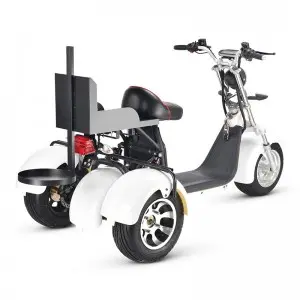Citycoco electric scooters are becoming more and more popular as a convenient and environmentally friendly urban transportation method. With their sleek design and electric engines, they offer a fun and efficient way to navigate city streets. However, many enthusiasts wonder if these stylish scooters can be modified for road use. In this blog, we’ll look at the potential of modifying Citycoco’s electric scooters and the legal considerations of putting them on the road.
First, it is important to understand the basic features of the Citycoco electric scooter. Designed for urban commuting, these scooters feature powerful electric motors, sturdy frames, and comfortable seats. They are typically used for short trips within city limits, providing a convenient alternative to traditional gasoline-powered scooters. However, their limited speed and lack of certain safety features may raise questions about their suitability for road use.
When adapting a Citycoco electric scooter for road use, one of the main concerns is its speed capabilities. Most Citycoco models have a top speed of approximately 20-25 mph, which may not meet the minimum speed requirements for road legal vehicles. In order to be considered roadworthy, these scooters need to be modified to reach higher speeds and comply with local traffic regulations. This may involve upgrading motors, batteries and other components to improve performance and safety.
Another important aspect to consider is adding basic road safety features. Citycoco electric scooters typically do not come with headlights, turn signals or brake lights that are necessary for road use. Modifying these scooters to include these features is critical to ensuring their visibility and compliance with road traffic laws. In addition, the addition of rearview mirrors, horn and speedometer will further enhance its on-road performance.
Additionally, registration and licensing issues must be addressed when considering putting modified Citycoco electric scooters on the road. In many jurisdictions, vehicles used on public roads are required to be registered and insured, and their operators must hold a valid driver’s license. This means that individuals who want to modify and use a Citycoco e-scooter for road trips will need to comply with these legal requirements, which may vary by location.
In addition to technical and legal considerations, the safety of riders and other road users is also paramount. Modifying a Citycoco e-scooter for road use also requires ensuring that it meets safety standards and is thoroughly tested to ensure its reliability and performance on public roads. This may involve carrying out crash tests, stability assessments and other safety assessments to ensure the modified scooter is suitable for road use.
Although there are challenges and considerations involved in adapting Citycoco electric scooters for road use, these stylish scooters certainly have the potential to become roadworthy vehicles. With the right modifications and compliance with legal requirements, Citycoco e-scooters can offer urban commuters a unique and sustainable mode of transportation. Their compact size, zero emissions and flexible maneuverability make them an attractive option for driving on city streets, and with the necessary enhancements, they could become a viable alternative to traditional gasoline-powered scooters.
In summary, the potential to adapt Citycoco e-scooters for road use is an interesting prospect that raises important technical, legal and safety considerations. While there are still challenges to overcome, the idea of transforming these stylish urban scooters into roadworthy vehicles offers hope for a sustainable urban transportation future. With the right modifications and compliance, the Citycoco electric scooter could carve out a niche as a practical and eco-friendly road trip option. It will be interesting to see how the concept evolves and whether electric Citycoco scooters become a common sight on city roads in the near future.
Post time: Mar-11-2024


